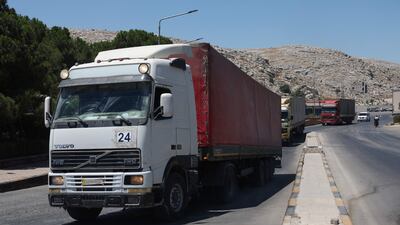Syria on Thursday said the UN could use a border crossing from Turkey to continue delivering aid to the north-western part of the country for another six months.
The announcement follows the failure of the Security Council this week to renew its authorisation for the operation.
The UN aid deliveries would have to be “in full co-operation and co-ordination with the Syrian government”, Syria's UN ambassador Bassam Sabbagh wrote in a letter on Thursday to the Security Council, seen by The National.
Security Council approval for the Turkish-based aid operation delivering help to several million people in rebel-held north-west Syria expired on Monday as members struggled to convince Russia to extend it for more than six months.
Russia vetoed Switzerland and Brazil's proposal to keep the Bab Al Hawa crossing open for nine months. The resolution was supported by 13 of the Security Council's members, with China abstaining.
A rival Russian resolution that would have extended the aid deliveries for six months but added new requirements failed to get the minimum nine “yes” votes for approval.
Secretary General Antonio Guterres had pushed for a 12-month renewal.
UN spokesman Stephane Dujarric said the letter from Syria had been received and the UN was studying it, Reuters reported.
Security Council authorisation was needed because the Syrian government did not agree to the UN operation.
It initially authorised aid deliveries in 2014 into opposition-held areas of Syria from Iraq, Jordan and two points in Turkey, but Russia and China whittled that down to one from Turkey.
Russia's deputy UN ambassador Dmitry Polyanskiy said there was now no need for the council to vote on any authorisation for cross-border aid deliveries and that avenue was “officially dead” now that the Syrian government had given its own approval.
“Every effort to put another draft to vote will constitute nothing but political games,” he posted on Twitter.
Russia and Syria have argued that the operation violates Syria's sovereignty and territorial integrity and that more aid should be delivered from inside the country.
This has raised fears among the opposition that all aid might fall under government control.
“The government of the Syrian Arab Republic has taken the sovereign decision to grant the United Nations and its specialised agencies permission to use Bab Al Hawa crossing,” Mr Sabbagh wrote.
They would be allowed “to deliver humanitarian aid to civilians in need in north-west Syria, in full co-operation and co-ordination with the Syrian government, for a period of six months, starting from July 13, 2023”, he said.
The UK's ambassador to the UN Barbara Woodward expressed her disappointment with Syria's proposal.
“Having sliced border crossings from four in 2014 to just one, on Monday Russia's veto ended that single lifeline,“ she said.
"Now President Assad has said he will open Bab Al Hawa for six months. But without UN monitoring, control of this critical lifeline has been handed to the man responsible for the Syrian people’s suffering.
"The priority needs to be getting aid flowing again, fast, to the people who need it – and then getting certainty over its future. We will not hesitate to bring this back to the Security Council.”
After an earthquake killed more than 50,000 people in Turkey and Syria in February, Syrian President Bashar Al Assad allowed the UN to use an additional two border crossings from Turkey to sent aid, but that approval expires on August 13.
About 4.5 million people live in the Idlib and Aleppo governorates, most of them refugees who fled other parts of Syria after a peaceful uprising against Mr Al Assad's regime turned into an armed rebellion in 2011.

